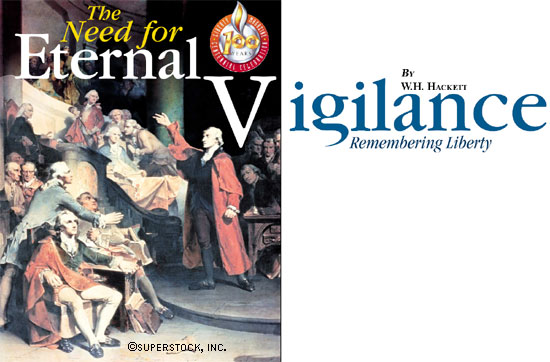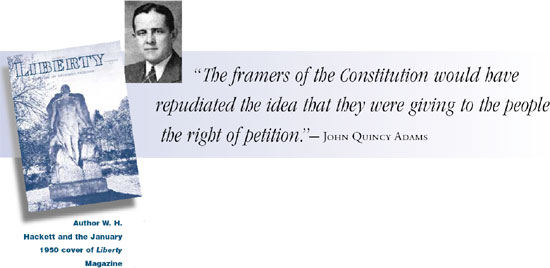The Need for Eternal Vigilance
W. H. Hackett January/February 2005
Getting your Trinity Audio player ready...

Liberty is not offered on the bargain counters—even in the United States, where too many people take it for granted.
Too often we give lip service to the saying "Eternal vigilance is the price of liberty," and then turn our backs and give attention to our own private affairs, falsely believing some imaginary police officer is standing guard over those principles for us.
But the police officer is not there.
Liberty will be preserved only by that eternal vigilance.
The seven words so often quoted in this country in connection with our freedoms are wholly inadequate in themselves and should never be separated from the complete statement that was uttered by John Philpot Curran in his "Speech Upon The Right of Election of the Lord Mayor of Dublin."
What he said was: "It is the common fate of the indolent to see their rights become a prey to the active. The condition upon which God hath given liberty to man is eternal vigilance; which condition if he break, servitude is at once the consequence of his crime and the punishment of his guilt."—Speeches of John Philpot Curran, vol. 2, pp. 235, 236.
Around the world today we find people manacled to some ideology or ism to which they are opposed and which robbed them of their once-cherished liberties—all because, in many instances, they were indolent and became a prey to the active. Religious liberties have been lost under just such conditions.
Here in this country we have been lulled into a semislumber in this respect by the importance we have placed on our great Constitution and its Bill of Rights.
As the result of two of our freedoms, press and speech, our people are today better informed on affairs of government than ever before. Yet they are not vigilant.
We cannot maintain our relationship to government at a pony express rate in an atomic age. Things move rapidly today on land, in the air, on the seas—and in government. Pressure groups and lobbyists take advantage of this condition. In many instances groups will feel that certain legislation is needed to correct some condition or circumstance irritating to them or beneficial to them, and sponsor a congressional bill covering the subject. In their zeal they may, and often do, go beyond the scope of the subject intended to be covered. Then, too, in their anxiety they may overstep the bounds and encroach upon the rights of others. It is here that eternal vigilance is needed.

Some years ago a bill was presented and endorsed by many well-meaning groups. It was reported favorably by a subcommittee and was well on its way to being presented to the whole Congress for consideration when belated "vigilance" appeared on the scene and held up passage of the legislation.
Although nearly too late, representatives of several religious organizations pointed out that the proposal, under strict interpretation, might even bar the transportation of the Holy Bible in the mails of the United States. Designed to keep defamatory writings out of the mail, the legislation was so written, however, that even general discussion of religious beliefs in printed tracts might be prohibited.
Every citizen of the United States has a right to speak up on such occasions. And that is not confined to speaking up as related to free speech.
The citizen may resort to his right to petition. The First Amendment provides that insofar as the national legislature is concerned, "Congress shall make no law respecting an establishment of religion, or prohibiting the free exercise thereof; or abridging the freedom of speech, or of the press; or the right of the people peaceably to assemble, and to petition the government for a redress of grievances."
This merely says that Congress shall make no law abridging the right of people to petition their government.
In a federal court case the court said, "[This amendment] assumes the existence of the right of the people to assemble for lawful purposes, and protects it against encroachments by Congress. The right was not created by the amendment; neither was its continuance guaranteed, except as against congressional interference. For their protection, in its enjoyment, therefore, the people must look to the States. The power for that purpose was originally placed there, and it has never been surrendered to the United States."
Forty-five of the 48 [at the time] states were prompt to take action to protect their citizens in their right to petition government for redress of grievances. This protection appears in the form of constitutional amendments.
These 45 states have specific provisions in this respect. The constitutions of two states omit specific reference to right of petition but have sections saying in substance, "The rights enumerated in this bill of rights shall not be construed to limit other rights of the people not herein expressed." One state constitution makes no reference to right of petition and has no provision blanketing other "rights" similar to the one just quoted.
A few examples of provisions of state constitutions guaranteeing the right of petition follow:
Article I, Section 10, of the Constitution of California says, "The people shall have the right to freely assemble together to consult for the common good, to instruct their representatives, and to petition the Legislature for redress of grievances."
In nearly every instance the state constitution links the right of assembly with the right of petition. The Constitution of Connecticut, Article I, Section 16, says in part that the citizens have a right "to apply to those invested with the powers of government, for redress of grievances, or other proper purposes, by petition, address or remonstrance."
The Constitution of Illinois, Article II, Section 17, says in part that the people have a right "to make known their opinions to their representatives, and to apply for redress of grievances."
Writers of the Constitution of Louisiana provided that the state's citizens should have the right to "apply to those vested with the powers of government for a redress of grievances by petition or remonstrance."—Article I, Section 5.
Maine has been very liberal, even including the word instruction. Article I, Section 15, of that state's constitution says in part that the people shall have a right at all times "to give instructions to their representatives, and to request, of either department of the government by petition or remonstrance, redress of their wrongs and grievances."
The Constitution of Maryland, Article 13, declares that "every man hath a right to petition the Legislature for the redress of grievances in a peaceful and orderly manner."
The Constitution of Wyoming, Article I, Section 21, emphasizes the right of the citizens "to make known their opinions."
The most popular wording of this subject in the various constitutions is the guarantee of the right of the citizens "to apply to those invested with the powers of government, for redress of grievances, or for other proper purposes, by petition, address, or remonstrance."
Congress has, during the years, been very careful to guard the matter of petition. Members of Congress recognize this as a forceful means of expression on behalf of their constituents.
There are very few occasions in the history of this country when any attempt has been made to curb the right of petition. An outstanding instance occurred during the hectic days of congressional debate over the slavery issue.
It began early in 1837 when his colleagues in Congress attempted officially to censure John Quincy Adams, then a representative in Congress, in connection with the question of right of petition on the slavery issue. Referring to Mr. Adams' letters to "the inhabitants of the 12th Congressional District of Massachusetts," which he represented, one writer has said, "It will be seen that, in the great struggle for and against the right of petition. . . the author [Mr. Adams] stood, in a great measure, alone and unsupported by his northern colleagues. . . He stood alone—beating back, with his aged and single arm, the tide which would have borne down and overwhelmed a less sturdy and
determined spirit."
Early that year the House of Representatives had voted to eliminate the reading of petitions on the question of slavery. They would merely be received and "laid on the table." On January 23, 1837, Mr. Adams presented 21 petitions. He was denied the privilege of reading them, and lost each appeal he made from the ruling of the chair. A few days later he received 30 other petitions. Among them was one purporting to be from slaves and imploring representatives from the North to cease offering petitions for emancipation of the slaves. Mr. Adams raised the question on the floor of Congress of whether slaves had the right of petition, under the action taken earlier that year with respect to petitions. This brought cries of "Expel him" from many of his colleagues, and a flow of resolutions of censure against him. Many heated words were hurled against Adams. His arguments were forceful, and his opponents, realizing they were losing ground, began to water down their resolutions, couching them in milder terms.
On February 9, 1837, Mr. Adams gave a historic speech on the right of petition. His remarks quoted here were reported by the editor of the Boston Daily Advocate.
"The framers of the Constitution would have repudiated the idea that they were giving to the people the right of petition. That right God gave to the whole human race when he made them men—the right of prayer by asking a favor of another. My doctrine is, that this right belongs to humanity—that the right of petition is the right of prayer, not depending on the conditions of the petitioner; and I say, if you attempt to fix any limit to it, you lay the foundation for restriction to any extent that the madness of party spirit may carry it. . . The right of petition contests no power; it admits the power. It is supplication; it is prayer; it is the cry of distress, asking for relief."
It was a forceful speech in defense of the right of petition, and after its conclusion less than two dozen votes could be mustered in support of a resolution for even the most indirect censure. All resolutions directed against Mr. Adams were rejected.
The fight over right of petition did not end there. On January 18, 1840, Representative William Slade, of Vermont, also made an effective speech, and a section of his speech is so important that it is worth repeating. He said, "The rule before us may seem to some a very small affair; but smaller encroachments on popular rights than this have grown to a fearful magnitude. The history of all usurpations shows that the disposition for encroachment uniformly increases with its acquisitions of power." Therein lies an important thought.
There are many supporters of religious liberty who refuse to arouse themselves at the first alarm of encroachment—or the second, or the third. The call seems "a small affair." However, as Representative Slade added, "The voraciousness of appetite is augmented by the aliment on which it feeds." Any whittling away of religious freedom will lead only to a greater slicing away of that liberty.
The right of petition is an important and a fundamental liberty and was recognized as such by those who drafted our federal and state constitutions. It should not be looked upon lightly when questions of religious freedom are before national and state legislative bodies.
___________________________
This article appeared in the January 1950 issue of Liberty—some topics are always relevant! With this present January issue Liberty embarks upon volume 100. There is no other religious liberty journal that can approach its record length of publication and wide distribution—almost 200,000 copies each issue to federal, state, and local legislators, judiciary, lawyers, and thousands of others who value religious liberty. During this centennial year we will regularly "sample" the Liberty heritage. Editor.
___________________________